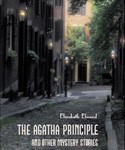 When it comes to The Arts, familiarity doesn’t breed contempt; it breeds sales. I have first-hand experience of this from my book events. Even though all four of my mystery books have equally good reviews, The Agatha Principle outsells the other three every time. Just that magical hint of the Agatha Christie name is enough for people to pick up the book and browse through it, and when they discover that the lead story is about a group of lawyers putting on The Mousetrap, the sale is usually clinched. One community theatre group in Vancouver regularly slips an Agatha Christie play into their season, simply because it will be guaranteed to boost the club’s revenue and help offset the costs of less popular plays. One would think that mystery enthusiasts would have seen all Christie’s plays and would want to see something where they don’t already know the ending, but no . . . as if drawn by a magnet, the public flocks to the familiar title and the theatre fills.
When it comes to The Arts, familiarity doesn’t breed contempt; it breeds sales. I have first-hand experience of this from my book events. Even though all four of my mystery books have equally good reviews, The Agatha Principle outsells the other three every time. Just that magical hint of the Agatha Christie name is enough for people to pick up the book and browse through it, and when they discover that the lead story is about a group of lawyers putting on The Mousetrap, the sale is usually clinched. One community theatre group in Vancouver regularly slips an Agatha Christie play into their season, simply because it will be guaranteed to boost the club’s revenue and help offset the costs of less popular plays. One would think that mystery enthusiasts would have seen all Christie’s plays and would want to see something where they don’t already know the ending, but no . . . as if drawn by a magnet, the public flocks to the familiar title and the theatre fills.
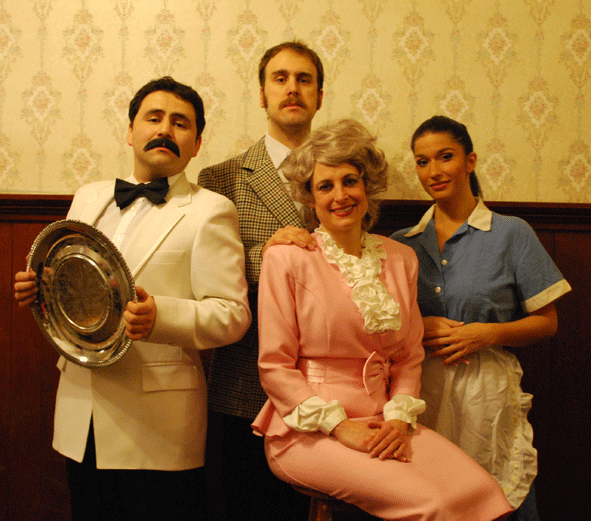
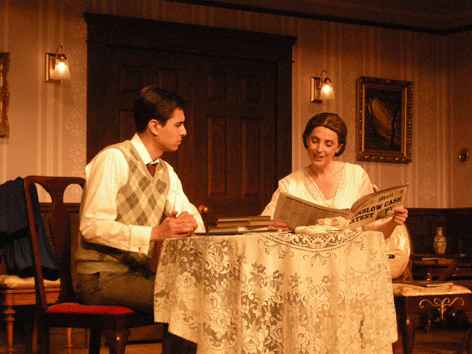
The same principle applies, of course, with all theatrical shows, not just Agatha Christie mysteries. Vagabond Players recent production of Fawlty Towers had more pre-opening reservations than the entire audience bookings for their fabulous production of Terence Rattigan’s The Winslow Boy. Musicals have been infected by the same bug. A visit to Broadway these days reveals more revivals or live remounts of Disney movies than original shows. Film is the same—remake, remake, remake. Opera is no different. For every production of Dialogue of the Carmelites, there must be a hundred productions of Carmen or La Boheme. Not to denigrate these popular pieces, since they are wonderful entertainments that I have thoroughly enjoyed myself, but, oh, how nice it is when something equally delightful comes along that happens to be new and fresh.
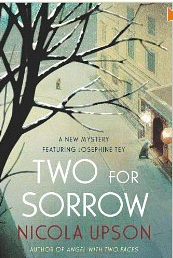
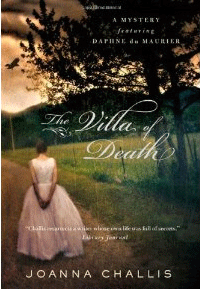
Given the wealth of information and entertainment that is available to people in the modern world, it’s hardly surprising that artists resort to whatever gimmick they can to grab a piece of the audience-pie. Writers have an especially hard time getting attention as their work becomes submerged in a constantly rising sea of blogs and e-books. No wonder so many current mystery writers are tagging famous names onto their titles. A trip to the mystery section of the library is like a walk through the literature of the last two centuries. We all knew that Sherlock Holmes was a detective, and can accept the mass of adventures he continues to have after the demise of his original creator, but who would ever have thought that Daphne Du Maurier, Oscar Wilde, Jane Austen or Josephine Tey were sleuths, feverishly engaged in solving mysteries in between their literary outpourings. The concept of a celebrity sleuth is fun, and there is a certain intrigue in trying to see how accurately a writer incorporates the events of a real person’s life into a mystery plot, but when I read those books, I find myself more focussed on the puzzle of who was real and who was invented than the mystery that provides the core of the plot.
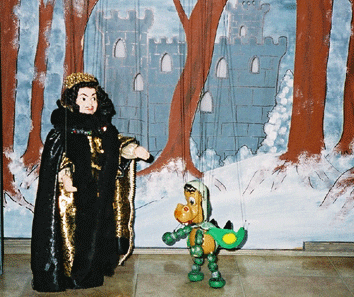
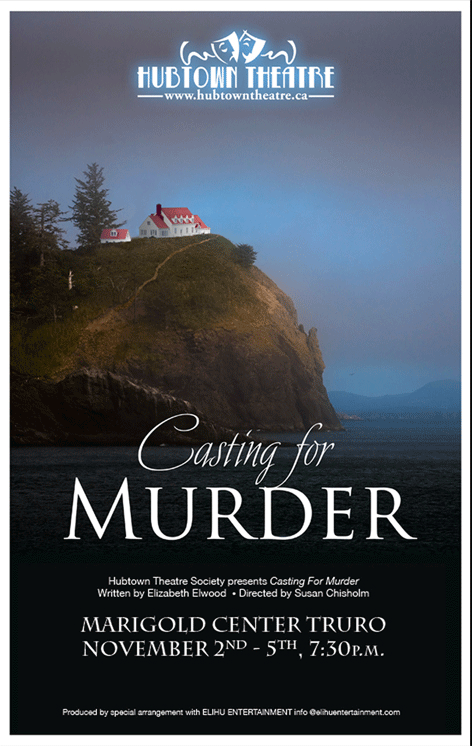 Ah, well, I am just as guilty. I love creating original characters and original stories, but every so often, the temptation to slip in a famous name or title overcomes me. My marionette shows include satirical Christmas musicals that purport to explain why Bad King John was bad and why Mad King George was mad, and my play, Casting for Murder, references the characters and situations in Noel Coward’s Private Lives. And last, but definitely not least, there’s The Agatha Principle. Yes, there’s no question about it. Agatha sells!
Ah, well, I am just as guilty. I love creating original characters and original stories, but every so often, the temptation to slip in a famous name or title overcomes me. My marionette shows include satirical Christmas musicals that purport to explain why Bad King John was bad and why Mad King George was mad, and my play, Casting for Murder, references the characters and situations in Noel Coward’s Private Lives. And last, but definitely not least, there’s The Agatha Principle. Yes, there’s no question about it. Agatha sells!
From The Agatha Principle
 If there was anything worse than having to direct a bunch of amateurs, he thought testily, it was having to direct a bunch of professional amateurs. Lawyers, he suspected, were going to prove the worst of the lot, particularly since their fundraiser for the Children’s Society happened to be an Agatha Christie murder mystery. During the preliminary reading of The Mousetrap, his cast members had made it plain that they had far greater knowledge of crime and police procedure than he did, not to mention far higher incomes. Every supercilious lift of an eyebrow had reminded him that, unlike their humble director who was earning a paltry fee that probably constituted his sole income for the month of January, his performers were donating their time. His actors had insisted that they needed no vocal direction since they were accustomed to public speaking, and when he had attempted to discuss character interpretation with the judge who was playing Mrs. Boyle, she informed him that she needed no assistance since she had dealt with every possible perversity of human nature over the course of her career. The last straw had come when the handsome and humourless litigator who was playing Giles drew him aside to explain with Teutonic solemnity that he was not to take offence if his actors argued over points of staging since they were creatures of far superior intelligence than the normal riffraff one would find in the theatre. Jordan still steamed at the memory. No wonder, he thought venomously, that Shakespeare had said, “Kill all the lawyers.” Yes, he decided, as he headed into the Old Chandler for the first blocking rehearsal, it was definitely time he took charge.
If there was anything worse than having to direct a bunch of amateurs, he thought testily, it was having to direct a bunch of professional amateurs. Lawyers, he suspected, were going to prove the worst of the lot, particularly since their fundraiser for the Children’s Society happened to be an Agatha Christie murder mystery. During the preliminary reading of The Mousetrap, his cast members had made it plain that they had far greater knowledge of crime and police procedure than he did, not to mention far higher incomes. Every supercilious lift of an eyebrow had reminded him that, unlike their humble director who was earning a paltry fee that probably constituted his sole income for the month of January, his performers were donating their time. His actors had insisted that they needed no vocal direction since they were accustomed to public speaking, and when he had attempted to discuss character interpretation with the judge who was playing Mrs. Boyle, she informed him that she needed no assistance since she had dealt with every possible perversity of human nature over the course of her career. The last straw had come when the handsome and humourless litigator who was playing Giles drew him aside to explain with Teutonic solemnity that he was not to take offence if his actors argued over points of staging since they were creatures of far superior intelligence than the normal riffraff one would find in the theatre. Jordan still steamed at the memory. No wonder, he thought venomously, that Shakespeare had said, “Kill all the lawyers.” Yes, he decided, as he headed into the Old Chandler for the first blocking rehearsal, it was definitely time he took charge.
[box]Originally published last year, but a timely renewal with a special thank-you to the friendly and helpful staff at Chapters Kelowna for hosting a recent event.[/box]
